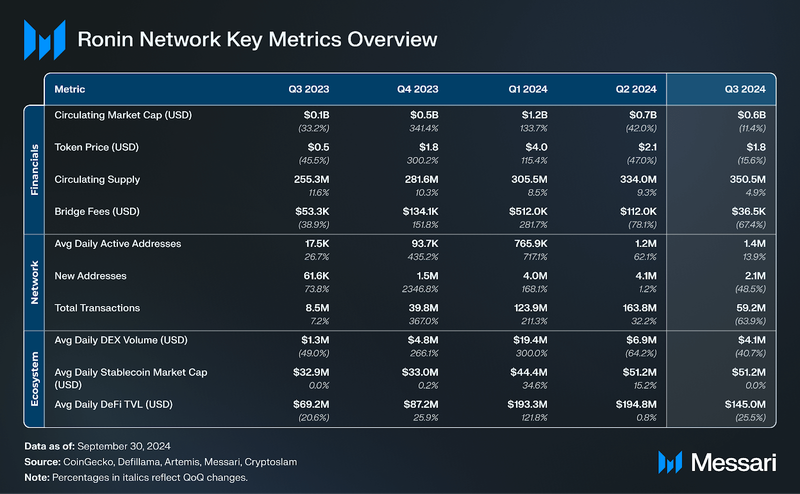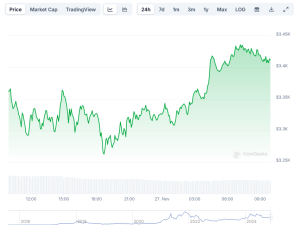Key Insights
- Ronin’s total DeFi TVL increased by 149% YoY to $147M in Q3 2024, driven by a 30% rise in the RON token price and ecosystem adoption, with Katana DEX contributing 99% of the total TVL.
- Total NFT trading volumes on Sky Mavis rose 37% YoY to $15M in Q3 2024, but declined 24% QoQ from $20M in Q2 2024.
- In Q3 2024, Ronin implemented Rotating Validators to strengthen decentralization, expanded its validator count from 22 to 28, launched the Waypoint wallet to streamline user onboarding, and enhanced its ecosystem by adding seven new game studios to the Forge Program.
- Ronin continues to strengthen its presence in the Web3 gaming space, attracting notable partners like Forgotten Runiverse, Lumiterra, and Tatsumeeko.
Primer
Ronin is a Layer-1 blockchain developed by Sky Mavis to address scalability challenges in Web3 gaming ecosystems, particularly for Axie Infinity. Initially using a Proof-of-Authority (PoA) consensus model, Ronin transitioned to Delegated Proof-of-Stake (DPoS) in 2023 to improve decentralization while maintaining efficient transaction processing. The 2024 Goda Upgrade further enhanced decentralization with Rotating Validators and separated block production from finality voting. Designed with developers in mind, Ronin is fully EVM-compatible, supporting tools such as Remix and Hardhat for streamlined integration. Future plans include the adoption of Zero-Knowledge (ZK) rollups, enabling game studios to scale with dedicated blockspace while maintaining unified liquidity on Ronin’s L1.
For a full primer on Ronin, refer to our Initiation of Coverage report.
Website / X (Twitter) / Discord
Key Metrics
Network and Ecosystem Activity

Total Value Locked (TVL)
DeFi TVL represents the total value locked across all DeFi applications on the blockchain, including staking, liquidity pools, and lending services.
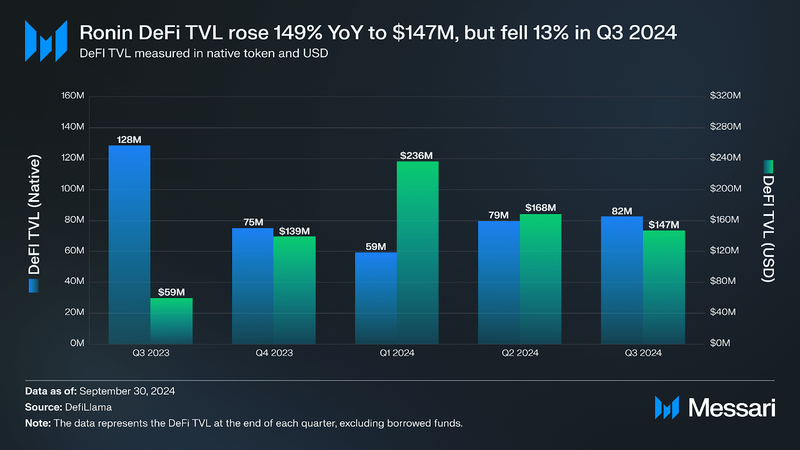
The total DeFi TVL on Ronin, denominated in USD, increased by 149% YoY, rising from $59M in Q3 2023 to $147M in Q3 2024. This growth was primarily driven by a 30% increase YoY in the RON token price (from $0.10 to $0.13) and broader ecosystem adoption throughout the year. However, native token TVL experienced a 36% YoY decline, dropping from 128M tokens in Q3 2023 to 82M tokens in Q3 2024. This decline suggests reduced token-based participation despite the rise in USD-denominated TVL. Contributing factors likely include diminished incentives for token locking, a shift in user priorities toward other ecosystem activities (e.g., gaming or NFTs), and a growing preference for holding RON tokens rather than locking them in DeFi protocols. Supporting this shift, the number of RON holders increased by 11,611% YoY, from 4,500 in Q3 2023 to 527,000 in Q3 2024. Additionally, RON holders grew by 20% QoQ, from 400,000 in Q2 2024 to 500,000 in Q3 2024.
On a QoQ basis, total DeFi TVL in USD fell by 13%, declining from $168M in Q2 2024 to $147M in Q3 2024. This decline was largely driven by a 7% drop in the RON token price, which offset a modest 3% QoQ increase in native token TVL (from 80M to 82M tokens). The slight increase in token-based TVL could be attributed to new incentives introduced by DeFi programs or liquidity pools, such as the integration of Wrapped Bitcoin (WBTC) on Katana during Q3 2024. However, the price-driven decline in RON negated these gains, leading to the overall reduction in USD-denominated TVL.
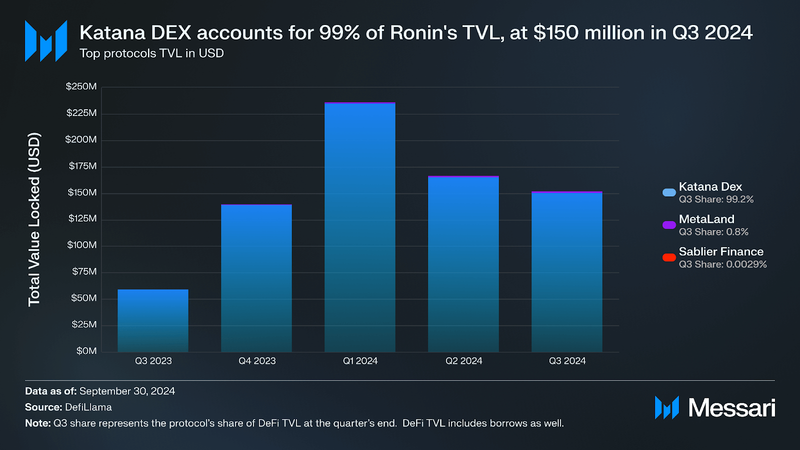
Katana DEX maintains a dominant position in the Ronin DeFi ecosystem, accounting for 99% of the total DeFi TVL on the network. In contrast, the next two largest protocols, Sablier Finance and MetaLend, contribute only 0.0029% and 0.77% to the total TVL, respectively, highlighting Katana’s significant role in driving DeFi activity on Ronin. As the primary decentralized exchange on the network, Katana DEX facilitates liquidity provision and token swaps for key ecosystem assets such as $RON, $AXS, and $SLP.
Katana’s TVL decreased 9% QoQ, from $165 million in Q2 2024 to $150 million in Q3 2024, a decline likely tied to the decrease in token prices mentioned earlier. However, on a YoY basis, Katana demonstrated substantial growth, with TVL rising from $59 million in Q3 2023 to $150 million in Q3 2024, representing a 154% increase YoY. This performance aligns with the broader expansion of Ronin’s DeFi ecosystem.
NFT Transaction Activity
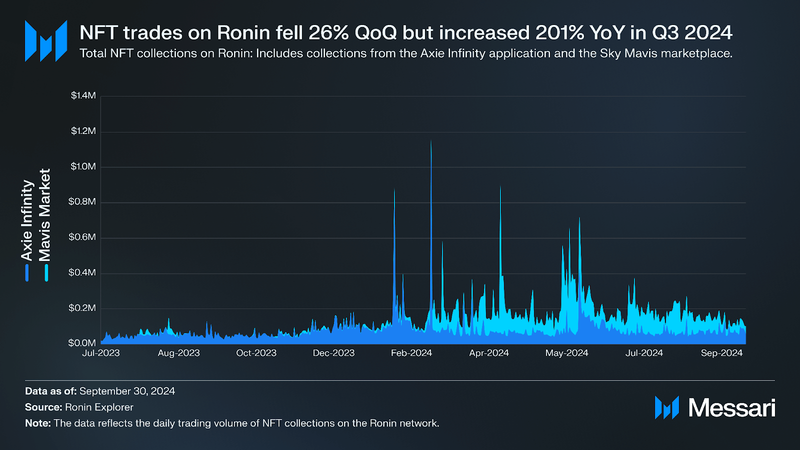
Sky Mavis hosts a wide array of NFT collections on its marketplace, featuring 58 categories that include consumables, in-game assets, character skins, and collectibles tied to various games within the Ronin ecosystem. These collections cater to diverse audiences, supporting titles such as Ragnarok: Monster World and Forgotten Runiverse, which utilize NFTs for gameplay enhancements and customization. Axie Infinity, the flagship game on Ronin, focuses on NFTs specific to its ecosystem, including Axies (playable characters), land parcels for exploration and strategy, and accessories for customization.
In Q3 2024, NFT trading volumes across Axie Infinity and the Sky Mavis marketplace revealed contrasting trends. Axie-specific trading volume fell 20% QoQ, from $8 million to $6 million, while other Sky Mavis NFT collections dropped 29% QoQ, from $12 million to $9 million. Daily average trading volumes also declined, with Axie-specific NFTs down 21% (from $87,000 to $69,000) and other collections down 30% (from $139,000 to $97,000). Despite these short-term declines, YoY growth was robust: Axie NFT trading volumes increased 37% from $50 million, and other Sky Mavis collections surged 1,799% from $0.5 million.
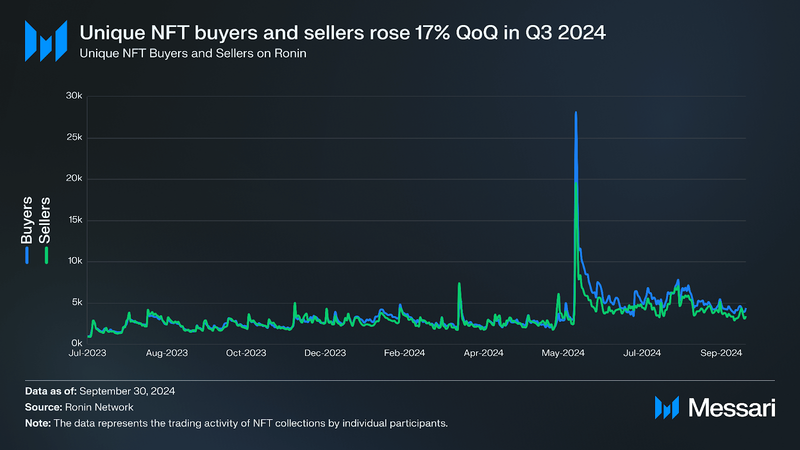
The unique daily NFT buyers and sellers on Ronin showed a consistent pattern throughout the year, with buyers outnumbering sellers, suggesting a tendency among users to hold NFTs rather than sell them. In Q3 2024, both buyers and sellers increased by 17%, with buyers rising from 4,400 to 5,100 and sellers from 3,700 to 4,300. This growth followed an all-time high in June 2024, influenced by the Coinbase Learn campaign and the Ronin Carnival, an ecosystem event featuring Axie Infinity missions, a $1 million Guild Wars competition by Apeiron, and free trials of advanced trading tools from 0xScope. These events contributed to engagement peaks of 28,000 buyers and 20,000 sellers.
User Activity and Transaction Fees
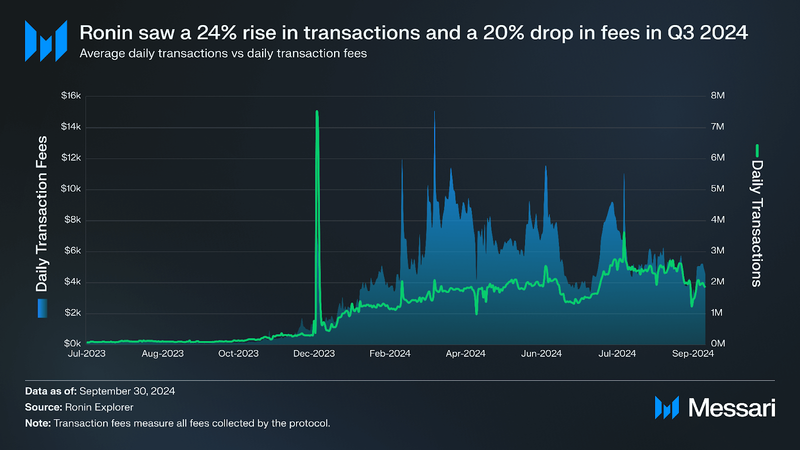
Average daily transactions on Ronin increased from 1.8 million to 2.2 million in Q3 2024, representing 24% QoQ growth. This surge can be attributed to several factors, including the onboarding of new games and partnerships. Titles such as Ragnarok: Monster World, Lumiterra, and Forgotten Runiverse transitioned from Ethereum to Ronin. Additionally, the Ronin Forge Program introduced seven new games, diversifying the ecosystem and attracting a broader audience.
Despite this growth, average daily transaction fees dropped 20% QoQ, from $7,000 to $5,000. This decline likely reflects Ronin’s focus on ecosystem expansion. Daily transactions surged from 90,000 in Q3 2023 to 2.2 million in Q3 2024, marking a 2,300% increase, YoY. Similarly, transaction fees rose from $134 in Q3 2023 to $5,000 in Q3 2024, a 4,000% YoY increase.
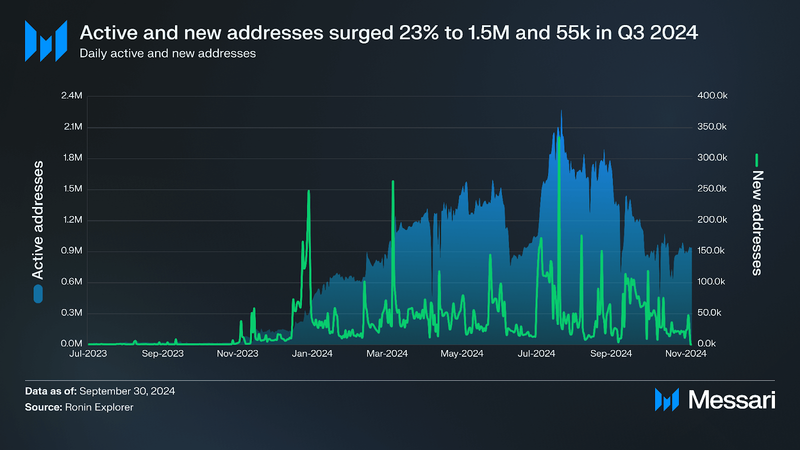
Active addresses on Ronin grew 23% QoQ, from 1.2 million to 1.5 million, while new addresses increased 22%, from 45,000 to 55,000. This growth aligns with the expansion of Ronin’s gaming ecosystem, driven by the onboarding of high-profile titles like Ragnarok: Monster World and Forgotten Runiverse. The Forge Program further diversified the platform by integrating games like Kuroro Beasts and Cambria.
Infrastructure upgrades, including the Waypoint wallet, have improved user onboarding, reduced costs, and enhanced accessibility. Waypoint is a wallet solution specifically designed for gaming, enabling users to perform on-chain transactions directly within game clients and supporting various gaming platforms. An example of its application is in Tatsumeeko, a JRPG-style game ecosystem. In its Telegram-based game, Lumina Hunt, Waypoint provides a secure and streamlined experience for managing blockchain interactions.
Additionally, NFT initiatives such as the CyberKongz Genkai Expansion, Moku NFT Sale and the Puff Astronaut NFT Mint contributed to wallet creation for trading and participation.
Token Analysis
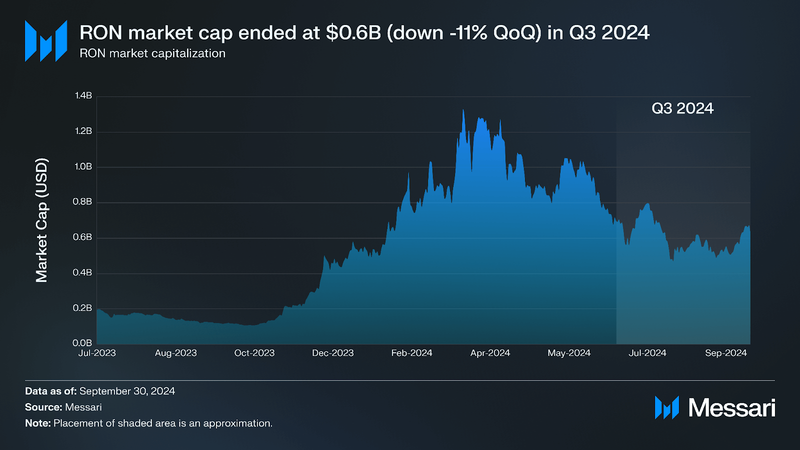
Ronin’s circulating market cap declined 11% QoQ in Q3 2024, falling from $0.7 billion to $0.6 billion, while still achieving a 500% YoY increase from $0.1 billion in Q3 2023. Similarly, the token price dropped 16% QoQ, from $2.1 to $1.8, but rose significantly by 260% YoY, from $0.5. Circulating supply grew 5%, from 334 million to 350 million RON. The QoQ decline likely reflects broader market conditions, profit-taking, or temporary corrections, whereas the YoY growth underscores the platform’s long-term trajectory.
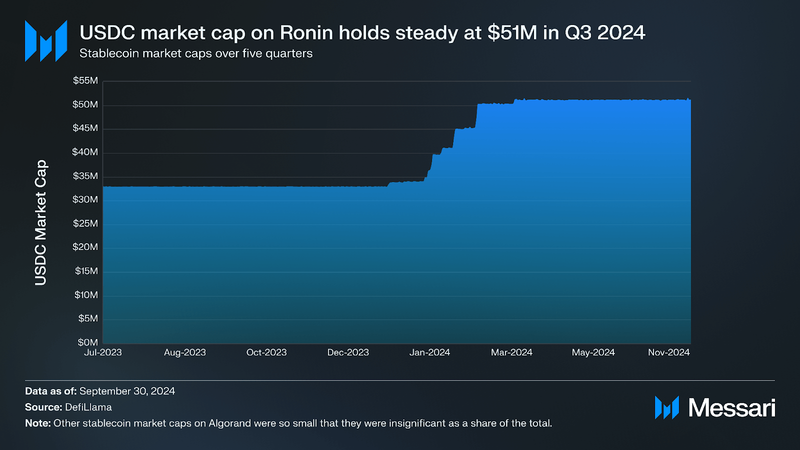
The USDC stablecoin market cap remained steady at $51 million in Q3 2024, unchanged from the previous quarter but increasing from $33 million YoY, marking its highest level to date within the Ronin ecosystem. This stability likely reflects ongoing player engagement in major games like Ragnarok: Monster World and Forgotten Runiverse, where USDC serves as a primary medium for in-game transactions and NFT trading. Its integration into Katana DEX liquidity pools has further cemented its role as a reliable asset for trading activities.
Qualitative Analysis
Partnerships and Developments
- Ragnarok: Monster World Collaboration: Ronin partnered with the renowned Ragnarok MMORPG franchise to launch “Ragnarok: Monster World” This collaboration introduced a Closed Beta Test (CBT) from August 19 to 25, featuring off-chain Ragmon NFTs that players could merge and upgrade. The event included daily login rewards, gameplay challenges, and a raffle system offering exclusive NFTs and prizes, fostering community engagement and strategic sharing among players.
- Ronin Forge Program Expansion: Ronin expanded its Forge Program by onboarding seven new game studios, each introducing innovative titles to the network. These include Pixel Heroes Adventure, a pixelated MMORPG designed for Android and iOS; Cambria, a RuneScape-inspired MMO with PvP and PvE modes; Kuroro Beasts, a gaming ecosystem featuring pet simulation, PvP battles, and collectible RPG elements; Infomon, a Pokémon-style blockchain game blending gameplay with crypto content; Xtremeverse, a third-person battle royale shooter; Last Odyssey, a simulation strategy game inspired by Rise of Kingdoms; and Party Icons, a social-focused battle royale mobile game.
- Lumiterra MMO Integration: Ronin partnered with Lumiterra, an MMO featuring engaging gameplay elements like combat, agriculture, and resource gathering. Its Closed Beta Test (CBT) enabled players to trade resources on-chain and compete for a $1 million rewards pool. During the beta, the platform recorded over 800K RON in NFT transaction volume and facilitated more than 14 million total transactions.
- Forgotten Runiverse Partnership: The MMORPG Forgotten Runiverse transitioned from Ethereum to Ronin, leveraging the platform’s enhanced scalability and user experience. During its beta tests, the game attracted 967,000 active wallets, accumulated 1.4 million hours of playtime, and achieved a retention rate of approximately 80%.
- CyberKongz Expansion: Ronin hosted its first non-Axie NFT mint with the CyberKongz Genkai collection, generating $1.4 million in a challenging market and demonstrating its capability to support third-party NFT collections. The Genkai NFTs introduced Dynamic Traits, allowing users to customize features like clothing and backgrounds, while collaborations with brands such as Adidas and 9dcc offered exclusive digital and physical collectibles, including the Genkai Warrior Hoodie. These innovations expanded the CyberKongz Emaki ecosystem and reinforced Ronin’s position as a hub for creative and innovative Web3 projects.
Ecosystem and Network Expansion
- Tatsumeeko Joins Ronin: Tatsumeeko, a popular life simulation RPG, migrated to Ronin, bringing its multi-game ecosystem. Its offerings include Lumina Hunt, a casual game on Telegram that rewards players with TATSU tokens; Tatsugotchi, a Discord-based pet simulator game; and Lumina Fates, an RPG featuring turn-based combat, customization, and homemaking. With closed and open beta tests planned for late 2024, Tatsumeeko’s migration enriches Ronin’s ecosystem by adding new gameplay dynamics and broader platform integration.
- Puffverse Ecosystem Expansion: The Puffverse introduced Puff Astronaut NFTs, granting players access to PuffGo and PuffSim. These NFTs provided gameplay advantages and token ($PUFF) rewards, enriching the Puffverse ecosystem. This expansion integrates unique assets designed to enhance user engagement and incentivize participation across Ronin’s gaming titles.
- Ronin Community Collections: Ronin launched Community Collections, allowing users to create and release their own NFT projects. Eligible participants, such as RON holders or top Axie players, could submit applications, with final selections determined by community votes. Successful projects received support from Sky Mavis, including launchpad tools and marketplace integration.
- Moku NFT Sale: Ronin’s Mavis Launchpad hosted a sale of 8,888 Moku Eggs, raising over $10 million through a Lucky Draw mechanism. The sale demonstrated the platform’s ability to facilitate high-demand NFT launches, further expanding its ecosystem and user base.
- Fight League Initiatives: Fight League launched free NFT mint events where players could obtain in-game buffs, such as reduced damage and increased attack speed. These included the release of Fight League Chips, which offered unique gameplay advantages.
- Tribesters Wildlings NFT Sale: Wildling NFTs were introduced as pet-like companions providing in-game bonuses for Keeper of Secrets. The sale marked a significant milestone for the upcoming social MMO Island of Solas, showcasing Ronin’s continued focus on integrating game-enhancing NFTs.
- PHPC Stablecoin Launch: Ronin partnered with Coins.ph to launch PHPC, a stablecoin pegged to the Philippine Peso. The first Philippine Peso stablecoin on Ronin was launched to facilitate fast, low-cost transactions. This development aimed to strengthen Ronin’s utility and adoption in Southeast Asia.
- Community Engagement Initiatives: Ronin organized multiple contests and events to engage its community: The Ronin Research Rumble (August 1–15) rewarded data-driven insights with prizes, including RON tokens and collectibles. PuffGo Preseason 4 (September 13–27) offered competitive rewards in USDC and vePUFF tokens, boosting player engagement and competition.
- Kaidro Spinwheel and Synergy Rewards: Kaidro introduced new rewards for its Play-to-Accumulate (P2A) system, allowing players to earn Rank Points (convertible to $KDR tokens) and Kalodium tokens through the Spinwheel and Synergy tasks. Additional prizes included NFTs from partnered games like Apeiron and Axie Infinity, exclusive Kaidro items such as Spark Suit Crate NFTs, merchandise, and opportunities to be featured in Kaidro’s comic series.
Technical Development
- zkEVM Initiative: Ronin plans to adopt zkEVM technology using Polygon’s Chain Development Kit (CDK), significantly enhancing its scalability and transaction capacity. This upgrade enables the network to handle between 400 million and 4 billion transactions daily, accommodating a growing user base and supporting game-specific blockchains like Pixels and Apeiron.
- Ronin Waypoint Launch: Ronin launched Waypoint, a universal account and keyless wallet designed to simplify in-game transactions. Features include gas-free transactions, seamless login without seed phrases, and enhanced security through Multi-Party Computation (MPC). This wallet integration streamlines asset management and gameplay, improving accessibility across the Ronin ecosystem.
- Validator Enhancements: Ronin increased the number of validators fir further decentralization.
- Cross Chain Bridge Enhancement. Validators approved integrating Chainlink’s Cross-Chain Interoperability Protocol (CCIP) to improve the Ronin Bridge’s security, reliability, and overall ecosystem support. Deployment and Migration is expected to complete by the end of 2024.
- Enhancements to Ronin Wallet and Ronin Bridge: Ronin introduced wallet delegation via Delegate.xyz, improving security by enabling interactions between hot and cold wallets. This feature allowed users to perform NFT transactions, claim airdrops, and conduct other on-chain activities without exposing valuable assets. Earlier in the year, the Ronin Wallet was updated with multi-chain support, and integrations with Binance Pay and Coinbase Pay. Additionally, the Ronin Bridge received upgrades to facilitate seamless token transfers between Ronin and Ethereum.
- Katana DEX Expansion: Katana DEX introduced Wrapped Bitcoin (WBTC), enabling users to trade Bitcoin-backed tokens without relying on centralized exchanges. New liquidity pools, such as WBTC/RON, were launched, allowing users to earn rewards while facilitating decentralized Bitcoin trading.
- Goda Upgrade: Ronin implemented Rotating Validators to increase network decentralization and conducted hardforks to enable upgradeable Axie and Land smart contracts. These updates were designed to enhance decentralization and governance across the network.
Governance
- REP-0010: Rotating Validators (Executed): This proposal enhances Ronin’s decentralization and security by introducing Rotating Validators, a new group participating in block production at a lower frequency. Validators are selected using a verifiable random function (VRF) and incentivized through staking rewards, addressing inactivity issues. All validators contribute to finality votes based on their staked amount, lowering entry barriers, promoting network security, and ensuring fair rewards for validators and delegators.
- Contract Upgrade (Executed): This proposal implemented upgrades to Ronin’s smart contracts, enhancing functionality and execution efficiency. Details of specific actions were not publicly disclosed.
- Ronin Bridge Selection (Executed): The selection process for the Ronin Bridge solution provider involved three candidates: Axelar, Chainlink (Cross-Chain Interoperability Protocol), and Stargate Finance (powered by LayerZero). In the voting, Chainlink received 10 votes, Stargate Finance x LayerZero received 3 votes, and Axelar received none. As a result, Chainlink was chosen as the provider for the canonical bridge on Ronin.
- Undecoded Action (Executed): A governance proposal with undisclosed details was successfully executed.
- Bridge Contract Upgrade (Approved): This approved proposal upgraded Ronin’s bridge contract to introduce new features and improve functionality, aligning the bridge with the network’s evolving needs for cross-chain operations.
- Bridge Parameters Adjustment (Executed):This proposal optimized Ronin bridge operations by mapping specific tokens and setting minimum thresholds, ensuring smoother token transfers and better asset management.
- Bridge Token Configuration (Approved): This governance approval mapped new tokens and set thresholds for the Ronin bridge, improving security, operational efficiency, and cross-chain interoperability.
Closing Summary
Ronin Network saw improvements across key performance indicators in Q3 2024, with DeFiTVL increasing 149% YoY to $147M, driven by a 30% rise in RON price and broader ecosystem adoption. Katana DEX accounted for 99% of DeFi TVL, while NFT sales volume grew 37% YoY to $7.6M, reflecting higher-value transactions despite a decline in activity. Active addresses grew 23% QoQ to 1.5M, aided by onboarding games such as Ragnarok: Monster World and Forgotten Runiverse. Infrastructure upgrades, including the Waypoint wallet and bridge improvements, enhanced user accessibility and interoperability. Ronin’s ecosystem continued to diversify with the Forge Program and partnerships introducing new games. Governance updates, such as Rotating Validators and bridge upgrades, aimed to improve decentralization and security.

